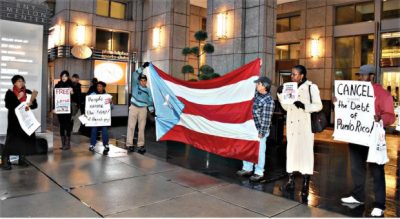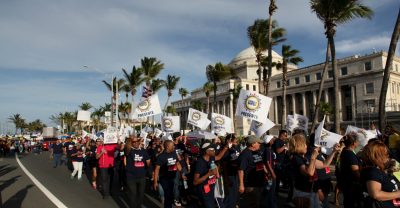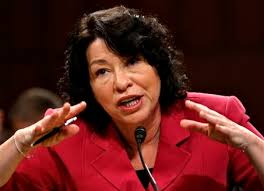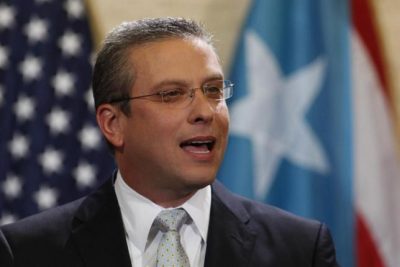U.S. Supreme Court ruled in favor of U.S. banks, vulture hedge funds
Hedge funds raping Puerto Rico also attacking Detroit, Argentina
Movement on to cancel Puerto Rico’s debt to banks
Videos: Brave New Films (photos, videos not part of Reuters story)
Jun 13, 2016

The Philadelphia-Camden Boricua Committee demonstrated Dec. 2, 2015 in front of the UBS Financial Services office in Philadelphia, part of a national appeal by the New York Call to Action on Puerto Rico to demand the cancellation of Puerto Rico’s debt and expose the criminal role of the banks and financial institutions that impose brutal austerity measures on the residents of the island. See
WASHINGTON — The Supreme Court on Monday refused to revive a Puerto Rico debt-restructuring law, putting the U.S. territory at risk of a messy default unless Congress this month passes legislation to help the Caribbean island survive its crippling fiscal crisis.
The justices ruled 5-2 that Puerto Rico’s 2014 statute, which would have let it cut billions of dollars in debt at public utilities over creditor objections, conflicted with federal bankruptcy law. The justices left in place a 2015 appeals court ruling invalidating the law, called the Recovery Act.
Passage of legislation now advancing in the U.S. Congress is likely the only remaining option to restructure Puerto Rico’s debt in a bid to avoid a default in the U.S. territory of about 3.5 million people that is burdened by a $70 billion debt load it has said it cannot pay.
The U.S. House of Representatives last Thursday overwhelmingly passed legislation creating a federal control board to help Puerto Rico cope with its debt, and sent the bill to the Senate for consideration. The White House has urged the Senate to act promptly so President Barack Obama can sign the bill into law ahead of a looming July 1 deadline for Puerto Rico to make a $1.9 billion debt payment.
But the Senate’s Republican leaders have not yet revealed their plans for dealing with the legislation.
The proposed oversight board would be tasked with working with investors on restructuring Puerto Rico’s debt and would have the authority to push the island into a bankruptcy-like court process in which it could restructure debt without the agreement of creditors.
Puerto Rico does not have Chapter 9 bankruptcy protection, unlike the 50 U.S. states. Puerto Rico’s governor, Alejandro Garcia Padilla, while supporting the bill generally, has expressed reservations about the broad powers it would give the oversight board.
Justice Clarence Thomas, writing for the Supreme Court, said Puerto Rico is not considered a U.S. state in one part of bankruptcy law, meaning it cannot authorize its municipal agencies to restructure debt. Justices Sonia Sotomayor and Ruth Bader Ginsburg dissented.
Puerto Rico, also hit by a 45 percent poverty rate and a shrinking population, faces economic calamity without measures that either change its laws or involve an agreement with creditors, which include U.S. hedge funds.
In 1984, Congress passed legislation that prohibited Puerto Rico, as a U.S. territory and not a state, from using laws that let states put struggling municipalities into bankruptcy.

Members of labor unions last year marched past the capitol in San Juan, Puerto Rico against an austerity plan to help the island’s debt crisis.
The reinstatement of the Puerto Rico law could have threatened a hard-fought, consensual restructuring at power authority PREPA under which creditors holding most of the utility’s $8.3 billion in debt agreed to take 15 percent reductions in payouts.
The Recovery Act might have allowed Puerto Rico to scrap that deal and instead put PREPA into bankruptcy, where it could impose deeper cuts and bind holdout creditors.
Two U.S. lower court decisions found the Recovery Act invalid after PREPA creditors sued. The Supreme Court heard arguments in Puerto Rico’s appeal on March 22.
“We are grateful for the Supreme Court’s careful consideration of the case, and are pleased that we now can put this litigation behind us,” said Matthew McGill, an attorney for one group of creditors.
The price on Puerto Rico’s benchmark 2035 General Obligation bond gyrated in the wake of the court’s decision. 74514LE86=MSRB
‘REAL WORLD CONSEQUENCES’
Puerto Rico’s governor signed an emergency bill on April 6 allowing the government to halt payments on its debt, throwing into doubt broader restructuring plans to stave off a financial collapse.
“Preemption cases may seem like abstract discussions of the appropriate balance between states and federal power,” Sotomayor wrote in dissent. “But they have real world consequences. Finding preemption here means that a government is left powerless with no legal process to help its 3.5 million citizens.”

U.S. Supreme Court Justice Sonia Sotomayor.
Sotomayor, whose parents were born in Puerto Rico and moved to New York before she was born, said Puerto Ricans “should not have to wait for possible congressional action to avert the consequences of unreliable electricity, transportation and safe water.”
Height Securities analyst Daniel Hanson said the ruling should be read in concert with a separate Supreme Court decision last week holding that Puerto Rico is not a separate sovereign entity from the United States for the purposes of bringing criminal charges.
The two rulings show that “Puerto Rico’s ultimate source of authority is the U.S. Congress, and the power to overrule what Congress has ordained – including in the Puerto Rico constitution – is non-existent,” Hanson wrote.

Puerto Rico’s governor Alejandro Garcia Padilla addresses the legislature about a billion-dollar cut in public spending and his new economic initiatives, in San Juan in this April 29, 2014 file photo. REUTERS/Ana Martinez-Santiago/Files
That could make it harder for Puerto Rico’s governor to make good on his threat to default on debt backed by Puerto Rico’s constitution in the name of maintaining government services, Hanson added.
Only seven justices considered the case because Justice Samuel Alito recused himself and Justice Antonin Scalia, who died in February, has not yet been replaced.
(Reporting by Lawrence Hurley; Additional reporting by Richard Cowan in Washington, Daniel Bases in New York and Nick Brown in San Juan; Editing by Will Dunham)
Related stories:
http://www.workers.org/2015/12/09/cancel-puerto-ricos-debt/#.V2gjKs_2bIU
http://www.reuters.com/article/us-usa-puertorico-governor-idUSKBN0TX2HD20151214

 By
By 


